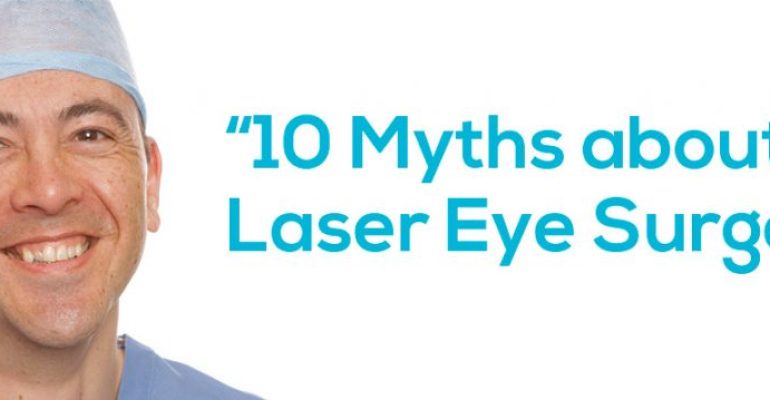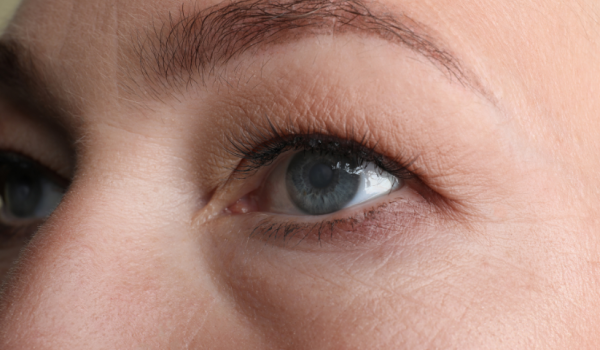As an eye doctor, I hear quite a lot of unusual ideas about laser corrective surgery. Probably the most common one is, “Lasering is painful!” (It isn’t! Honestly!) “If I sneeze at the wrong moment, the whole operation will be ruined…” That’s another one I hear from time to time. It’s hard to say where these notions come from, but I do understand them. They probably stem from people’s anxieties about an operation that isn’t always well understood. And that’s natural, because our vision is incredibly precious. Part of my job, then, is to reassure people about the benefits and safety aspects of laser: to bust a few of the unhelpful myths, if you like. With that in mind, here are 10 of the most common ones – and how I would answer them.
1. It won’t work: I’m too short sighted…
This is possible, but unlikely. The treatable prescription range for laser vision correction is usually around +4 to -10. That’s a very broad demographic. In fact it probably constitutes 95% of all patients. It is true, however, that laser surgery requires a certain corneal thickness in order to work optimally; we need to operate with a safety margin of untreated eye tissue. But since this varies from patient to patient, it’s something we would assess at consultation. And if you were to fall into that 5%, there are always alternatives: Implantable Contact Lenses (ICL), for example. But, in practical terms, the vast majority of people are eligible for laser surgery.
2. I’m too old…
The truth is, you are never too old to at least consider laser eye surgery: I have treated patients in their 60s. That said, age can affect suitability. And that’s because the eyes are continually changing. Typically, our vision stabilizes in our mid-20s – which is one reason why people in their 20s and 30s tend to make the best candidates for corrective surgery. By 50, the risks of dry eye are greater – and that might make LASIK inappropriate. But not necessarily. Many people in their 50s, 60s and 70s are perfectly suited to treatment, particularly the correction of presbyopia. We just need to make that judgement on a case-by-case basis.
Laser eye surgery is completely painless
3. The laser will hurt…
It won’t! All patients are given anaesthetic eye drops about 15 minutes before undergoing surgery. These quickly numb the eyeballs, preventing any discomfort during the process. With LASIK, it’s common to experience a slight feeling of downward pressure. This happens when the Femto laser ‘docks’ with your eyeball, and it lasts for about 25 seconds. People sometimes think you will be able to feel the corneal flap itself being created. That’s another myth. You won’t. The bottom line: laser eye surgery is completely painless.
4. It’s a very new technology…
Actually, LASIK was first approved by America’s Food and Drug Administration (FDA) in 1998. That’s nearly 20 years ago, and the technology has improved immeasurably since that time. Our own National Institute for Health and Care Excellence (NICE) declared it safe and efficacious for use in 2005. A 2008 study by the American Society of Cataract and Refractive Surgery (ASCRS) found that 95.4% of patients were satisfied with their LASIK treatment. That’s one of the highest approval rates in surgery.
They can follow the eyes far faster than you would ever be able to move them.
5. If I blink, sneeze or move my eyes, the laser won’t work properly…
It will! Firstly, we have fixation lights for you to look at during the procedure. These help you to maintain a steady gaze. But even if you do blink, sneeze, fidget or cough, there’s no need to worry. Human eyes move at around 300 metres per second. That sounds fast, until you discover how quickly a laser can react: up to 500Hz, which is 500 times per second, with a response time of 4-6 milliseconds. They can follow the eyes far faster than you would ever be able to move them. You could flick your eyes from left to right during the procedure and the laser would have no trouble tracking and treating them.
6. I’ve heard there’s a burning smell!
It’s true that there is a slightly unusual smell associated with laser treatment, but it isn’t burning! It couldn’t possibly be, because lasers have virtually no thermal (ie heat) effect on your tissue. The actual cause of the odour is a chemical reaction that happens when the laser interacts with the cornea. It happens at the molecular level, as carbon atoms are released into the air. That perhaps also gives you a sense of how good the laser technology is. It’s operating on your eyes with near-atomic precision – which in itself is reassuring.
Aftercare is an essential part of the laser eye surgery service.
7. Once the operation is over, I’m on my own…
This couldn’t be further from the truth. A reputable ophthalmologist will always offer you a comprehensive post-op follow-up plan. Your first assessment is the day after surgery (or four days for LASEK patients). We will then meet again two to four weeks later, and again after three to six months. In the rare event of problems or complications after surgery, a 24-hour emergency number gives you immediate access to medical advice or assistance. Aftercare is an essential part of the laser eye surgery service.
8. I won’t be able to work or drive for weeks…
We usually recommend taking three or four days off work to recover from LASIK, and a little longer for LASEK. But that’s erring on the side of caution. While vision is commonly a little blurred and the eyes can be light-sensitive for a few hours following surgery, the recovery period thereafter is usually swift. Some of my LASIK patients resume work within 24 hours. Most people will be able to drive within two to three days. After LASIK, we are normally able to clear you for driving at your first post-surgery eye examination.
9. I will never need glasses or contact lenses again…
Sadly laser surgery isn’t a passport to a lens-free life! But of course this is true of all eyes. The aim of laser treatment is to permanently alter the structure of the cornea, and it does this very effectively. But the cornea – like every other part of your body – changes with age. Everybody, for example, will develop presbyopia (a hardening of the eye lens) as they enter their 40s and 50s. That doesn’t mean, if you happened to have LASIK in your 20s, that the treatment has “worn off”. It just means that your eyes have aged in the normal way. And of course there are plenty of things we can do to help when that happens too.
10. It’s prohibitively expensive…
Obviously, cost is relative. But I think there are good reasons to say that laser eye surgery is worth the money. First and most obviously, our vision is incredibly important. Seventy percent of all the sensory information we process comes through the eyes. So any change in vision – for good or ill – has a tremendous impact on our day-to-day lives. Second, I think it makes good financial sense. Let’s say you get treated at the age of 21. You might then be lens-free for 30 years. In many cases that would make laser surgery cheaper than wearing contacts or glasses. Our prices at Anderson Eye Care start at £1795 per eye.
Medical Disclaimer
This article is for information purposes only and should not be considered medical advice. If you or any other person has a medical concern, you should consult with your health care provider or seek other professional medical treatment. Never disregard professional medical advice or delay in seeking it because of something that you have read on this blog, website or in any linked materials.







